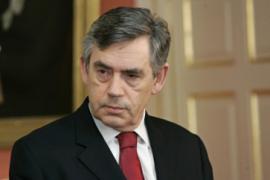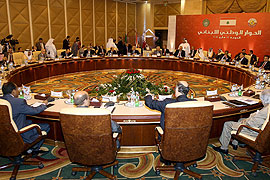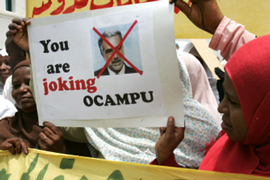Mixed reaction to ICC ruling
While Arab reaction has been muted, world leaders are divided on Omar al-Bashir’s indictment.

 |
| Omar al-Bashir has been trying to rally support from African allies, as well as China and Russia [GALLO/GETTY] |
The International Criminal Court’s (ICC) decision to charge Sudan’s president with crimes against humanity and seek a warrant for his arrest has solicited mixed world reaction.
Omar al-Bashir has said the ICC prosecutor’s attempts to charge him are politically motivated and carry no weight in his country as Sudan is not a member of the ICC and cannot come under its jurisdiction.
He has denied all claims in the charges and will seek regional and international support from allies such as fellow African nations, China and Russia.
But in Sudan, itself, reactions have been mixed, with ethnic minorities and rebel groups expressing support for the ICC charges.
Sherif Harir, a senior member of the Sudan Liberation Movement urged the UN to act in accordance with the ICC report and arrest of the Sudanese president.
Suleiman Sandal, deputy chief of staff of the Justice and Equality Movement in Sudan, has also expressed the necessity of such an arrest, calling it, according to the Reuters news agency, a “victory for humanity”.
African Response
Jakaya Kikwete, the Tanzanian president and chairman of the African Union, said that arresting al-Bashir could cause a power vacuum in Sudan that “risks military coups and widespread anarchy reminiscent of what is happening in Iraq”.
Bernard Membe, the Tanzanian foreign minister, speaking on behalf of Kikwete, said the AU was calling for “a deferment in indicting [al-Bashir] because there is a risk of anarchy in a proportion we have not seen in this continent”.
“We would like ICC to suspend its decision to seek al-Bashir’s arrest for a moment until we sort out the primary problems in Darfur and southern Sudan,” Membe said.
Powerful Allies
China, an ally of Sudan which also has a permanent seat on the UN Security Council, has said the removal of al-Bashir will create civil unrest and would be detrimental to Sudan.
“To the relevant moves of the ICC … we express our concern. We hope the relevant moves are conducive to the stability of Sudan,” Liu Jianchao, a foreign ministry spokesman, said.
The two countries have a significant trade relationship, with Sudan one of China’s main exporters of oil. China, which is said to be a major arms provider to Sudan, is also keen to avoid controversial issues in the build up to the Olympics.
ICC support
 |
| Gordon Brown supported the ICC indictment [AFP] |
Europe, though, has generally backed the ICC.
Gordon Brown, Britain’s prime minister, expressed Britain’s support of the ICC and urged Sudan to comply with the decisions of the ICC.
Bernard Kouchner, the French foreign minister, has said that the Sudanese President must obey the ICC’s decision.
“It is a decision of the International Criminal Court and President Bashir must respect it,” Kouchner said.
Meanwhile, the US, even though it has supported investigations in Darfur, is hesitant to allow the ICC’s jurisprudence to preside over any heads of state.
Though the US has agreed war criminals must be exposed and brought to trial, it is itself not a part of the ICC.
The US has increased security in its embassy in Sudan in anticipation of possible civil unrest.
Arab Silence
 |
| The Arab League will discuss a response to the ICC indictment on Saturday [EPA] |
Arab Foreign Ministers are to hold an emergency meeting on Saturday to discuss the genocide allegations and the ICC charges.
Amr Moussa, Arab League secretary-general, has expressed concerns on behalf of the Arab League, stating that the ICC charges may not have been “well considered”.
But Arab media has largely been silent on the issue.
According to Lawrence Pintak, a journalist and Arab media expert, the reason is that Arabs usually see themselves as the victims and not aggressors, and in this case “Arabs here are good guys and bad guys”.
Though Arab media has successfully portrayed the worlds’ opinions on the matter, official comments coming from Arab leaders or diplomats are lacking.
One of the few commentaries came from Egyptian newspaper “Al-Gomhuria”. The newspaper claimed that the ICC charges are a result of American intervention in the region, in an attempt to strengthen its control over the area.
The newspaper has also cited Egyptian President Hosni Mubarak as saying that the ICC charges on al-Bashir are threatening the peace process in Darfur.
United Nations
Ban-Ki Moon, the UN secretary general, has distanced the UN from the ICC, noting that the court is not a part of the United Nations.
He has also expressed concerns of the potential ramifications if the Sudanese president were to be arrested, saying it could complicate the peacekeeping process in Darfur.
The UN has begun relocating some of its peacekeepers within Sudan to ensure their safety.
Rights groups
 |
| Demonstrations in Khartoum have criticised the ICC prosecutor [AFP] |
Human Rights Groups have generally been in favor of charging the Sudanese president.
Human Rights Watch (HRW), which has blamed the deaths of hundreds of thousands of people on al-Bashir and other senior Sudanese officials, has said his arrest will be a step towards ending conflict in Darfur.
“Charging President al-Bashir for the hideous crimes in Darfur shows that no one is above the law,” Richard Dicker, director of Human Rights Watch’s international justice programmes, said.
“The warrant request against President al-Bashir is one step towards ending the environment of total impunity that continues in Sudan today.”
Amnesty International has also supported the ICC’s decision to charge al-Bashir, calling the move “an important step towards ensuring accountability for human rights violations in Sudan”.